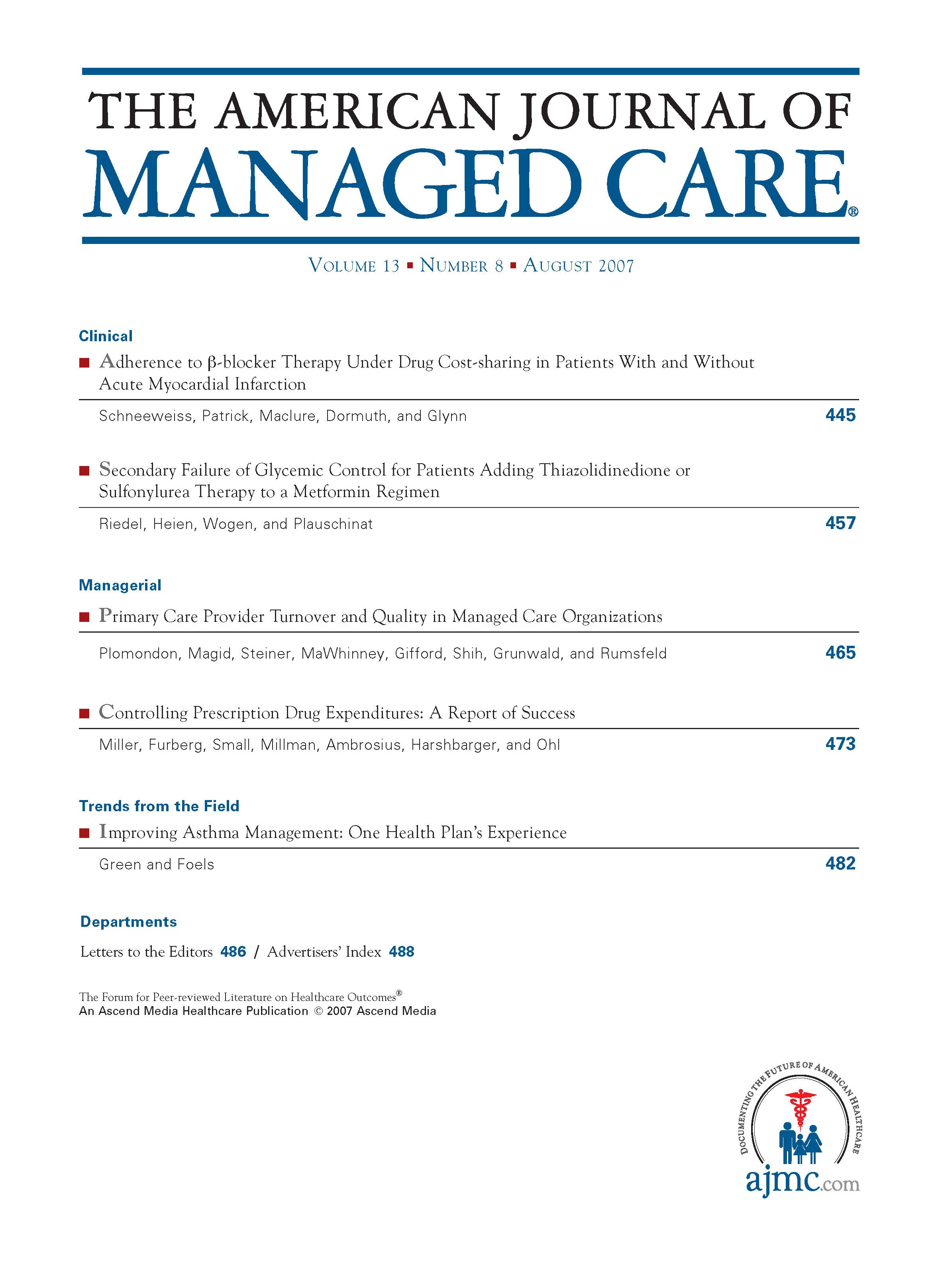- Center on Health Equity & Access
- Clinical
- Health Care Cost
- Health Care Delivery
- Insurance
- Policy
- Technology
- Value-Based Care
The Effects of Cost Sharing on Statin Adherence
TO THE EDITORS:
The very interesting articles by Gibson and colleagues1,2 stressed that decreasing the patient's share of costs for a maintenance-drug regimen could be an effective intervention for higher adherence, especially for lipid-lowering drug therapy, because lower statin copayments were associated with higher levels of adherence. A similar study by Schultz et al3 on the impact of statin copayments on adherence demonstrated that the mean copayment for statins increased while the likelihood of compliance decreased. The study showed that a $15 increase to the mean copayment decreased the probability of compliance by 10%, while a $50 increase reduced the probability of compliance by 34%.
Indeed, we also believe that high copayments can be a very important financial barrier to statin adherence, because the index copayment amount can severely affect compliance with statin use. Although our expertise may be limited, we would like to offer some suggestions in the hope that our experiences may be useful to others. In Greece (a member of the European Union), where the health system policy is very different from that of the United States, copayment status does not negatively affect compliance with statin use. On the contrary, drug adverse effects, misconceptions about drug therapy, alternative medicine treatments, sterol-enriched food products, as well as other nonfinancial factors are mainly responsible for reduced compliance.4 All insured (privately or publicly) patients, who account for the majority of the Greek population, have a standard fixed 10% share of costs (copayment) on prescribed statin therapy*; poor and uninsured patients receive 100% full health-insurance coverage and are not required to share costs (no copayment).
In Greece, where there are remarkably few patients noncompliant with their prescribed statin medication due to financial barriers, the effect of very low copayments in maintaining compliance is indisputable. Although some may consider the initial loss of the high copayment to negatively affect health plan expenditures, the future cost savings associated with decreased cardiovascular events and procedures because of higher statin adherence, as also stated by Gibson et al,1 will certainly more than offset the copayment loss. Without any doubt, the magnitude and importance of similar modifications and decisions regarding the share of costs and drug prescription copayments from policy makers is enormous and has extensive financial and social consequences; however, related experience coming from a small country like Greece could be very valuable. We strongly believe that the reduction of financial barriers by lowering copayments can be a clinically effective and a cost-effective benefit plan option.
Alevizos Alevizos, MD
Anargiros Mariolis, MD, PhD
Health Center of Vyronas
*Note: It is important to clarify that the 10% patient copayment is valid for severe medical conditions such as cardiovascular disease and respiratory diseases (chronic obstructive pulmonary disease and asthma), but not for all prescribed medication. The copayments are substantially higher (25%) for most other medical conditions and reach 100% for nonevidence-based medications (herbs, homeopath, complementary, and alternative medicine therapies). Copayments are fixed at 0% for special medical conditions such as cancer, epilepsy, schizophrenia, etc.
Author Disclosure: The authors (AA, CM, AM) report no relationship or financial interest with any entity that would pose a conflict of interest with the subject matter discussed in this manuscript.
Authorship Information: Concept and design (AA); analysis and interpretation of data (AA, CM, AM); drafting of the manuscript (AA, CM, AM); critical revision of the manuscript for important intellectual content (AA, CM, AM); administrative, technical, or logistic support (AA); supervision (AM).
Address correspondence to: Dr Alevizos Alevizos, Department of General Practice/Family Medicine, Health Center of Vyronas, 3 Korytsas St, 16231 Athens, Greece. E-mail: info@hcvyrona.gr.
1. Gibson TB, Mark TL, McGuigan KA, Axelsen K,Wang S. The effects of prescription drug copayments on statin adherence. Am J Manag Care. 2006;12:509-517.2. Gibson TB, Mark TL, Axelsen K, Baser O, Rublee DA, McGuigan KA. Impact of statin copayments on adherence and medical care utilization and expenditures. Am J Manag Care. 2006;12Spec no:SP11-SP19.
4. Alevizos A, Mihas C, Mariolis A. Advertising campaigns of sterol-enriched food. An often neglected cause of reduced compliance to lipid lowering drug therapy. Cardiovasc Drugs Ther. 2007;21:133-134.

HEDIS Glycemic Goal Achieved Using Control-IQ Technology
December 22nd 2025A greater proportion of patients with type 1 diabetes who used automated insulin delivery systems vs multiple daily injections achieved the Healthcare Effectiveness Data and Information Set (HEDIS) glycemic measure.
Read More
Linking Data to Determine Risk for 30-Day Readmissions in Dementia
December 22nd 2025This study found that certain characteristics in linked electronic health record data across episodes of care can help identify patients with Alzheimer disease and related dementias at high risk of 30-day readmissions.
Read More
Performance of 2-Stage Health-Related Social Needs Screening Using Area-Level Measures
December 19th 2025Limiting health-related social needs screening to lower-income areas would reduce screening burdens; however, this study found a 2-stage screening approach based on geography to be suboptimal.
Read More
Impact of Medicaid Institution for Mental Diseases Exclusion on Serious Mental Illness Outcomes
December 17th 2025Medicaid’s Institution for Mental Diseases (IMD) rule bars federal funding for psychiatric facilities with more than 16 beds, but findings indicate that state waivers allowing treatment of serious mental illness in IMDs do not increase overall psychiatric hospitalizations.
Read More

